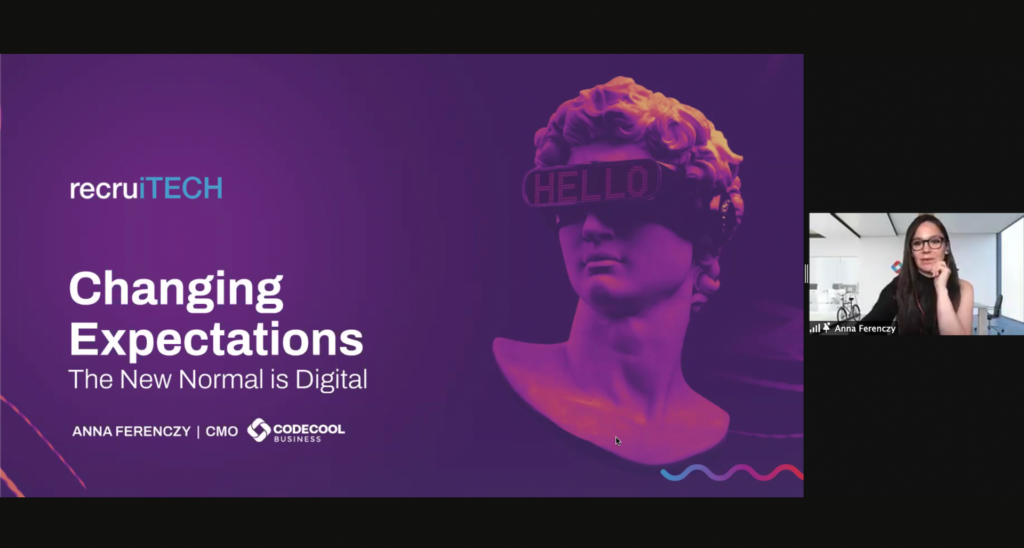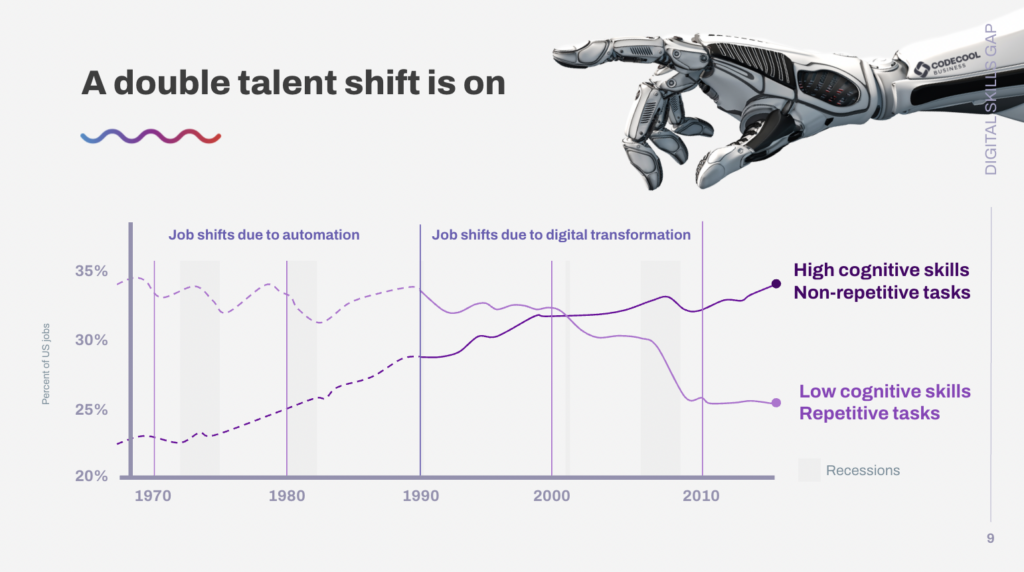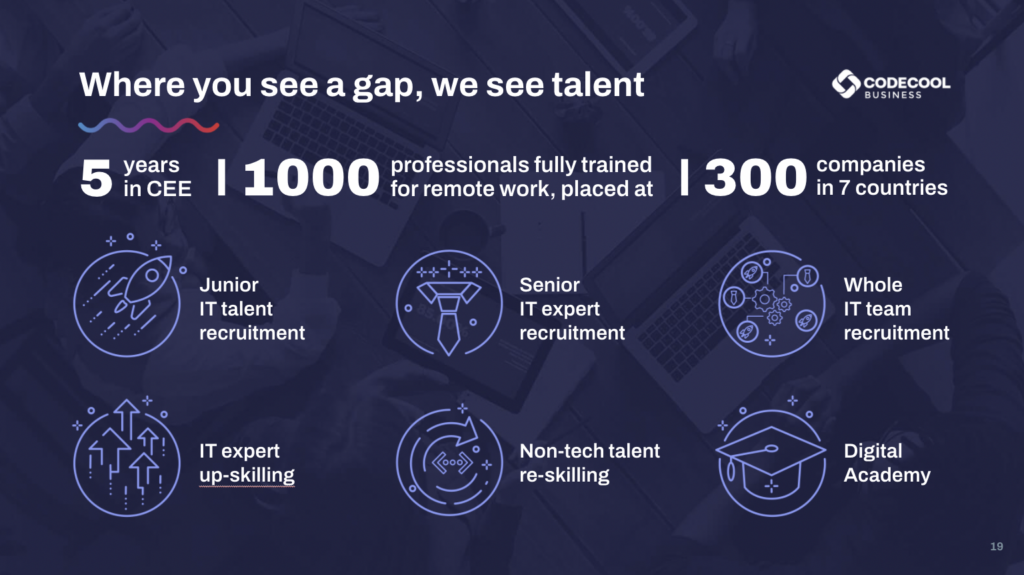By now we all know that we’ll never go back to the „normal” we once knew. The new normal we are headed may not be fully clear yet, but it’s definitely going to be digital. To get there we’ll have to make at least one big jump in the process, over the ever-widening digital skills gap. What can help us to make the jump? For one, remote work combined with global recruitment, and a future vision called ‘digital CEE talent hub’.

RecruiTECH Romania conference was created to act as a compass for the recruitment profession, to gather and share the best international and national white collar recruitment practices. This year’s event was centered around “(making) the most of a changed labor market with a new perspective and digital tools”.
Codecool CMO, Anna Ferenczy has been invited to share her view on Covid-accelerated digitalisation, it’s impact on the global tech skills gap and a possible solution called ‘CEE digital talent hub’.
Here’s a recap of some key points from her presentation.

Old digital goals and obstacles are so out
Remember the time when we all tried to justify digital transformation plans by cost-cuts and find solutions to organisational siloes and cultural problems? Good old times, right? We never knew our clock was ticking. Would you believe this was just a few years ago, before Covid. In 2017, 48% of corporate leaders used to list scaling down cost as a top 3 digitalisation priority, and listed cultural and organisational bottle-necks as major concerns. And this was just in 2017, according to McKinsey.
And then, a pandemic happened.
Today, digitalisation is a matter of life-or-death, and the global hunt for tech talent is like the 19th century California gold-rush. 87% of leaders see digitalisation as a means of survival, getting ahead of competition or reinventing their business, with only 10% of them listing cost-cuts as a top priority. And 75% of leaders struggle with hiring the right fit for digital positions.
Quite a turn of winds for digital strategies and efforts, in a blink of an eye.

It’s not just about the future of your business – it’s personal
Today there are about 41 million tech jobs to be filled globally. On top of this 41 million, an additional 149 million new ones will be created by 2025, waiting to be filled.
The new 149 million include jobs in:
- software development (98 million),
- cloud and data management (23 million),
- data analysis, AI and machine learning (20 million),
- cyber security (6 million) and
- privacy and trust management (1 million).
Next to the business side of the story, there is a personal aspect as well. More and more people are losing their jobs to digitalisation, forced to reinvent themselves for a high-tech future. The trend has not started today, it has been going on for decades now, but it definitely got a boost last year.
Today we’re in the middle of a new, and very special industrial revolution. For the first time in history not high skill jobs are taken over by the machines, allowing people easily find work in lower skill professions. On the contrary: machines are now taking over repetitive, low-skill tasks, while jobs requiring high cognitive skills are on the rise for the human work force.
This time people will need to substantially re-skill and up-skill to reinvent themselves, or they’ll fall behind. It’s not only digital strategies and corporate competitiveness at stake, but individual lives, too. What does a good up-skilling strategy has to focus on, to prepare for an unpredictable, but surely digital future? Some say, the focus should be on coding and empathy. Coding because the digital future will not just happen by itself, we have to build it first. And empathy, because we’ll have to manage brand new challenges, and reinvent our ways again and again in the meantime.

The gap keeps widening
On the booming digital job market talent is gold. But people are much faster in adapting to a digital lifestyle and way of working than building digital skills or switching to tech jobs. The tech skills gap is wider than ever and it seems to be growing.
There are multiple additional factors at play here:
- Digitalisation beyond IT – the 149 million new jobs are more or less just the IT positions. But we are also seeing a digitalisation of classic business functions and traditionally non-tech industries. The trend is viral and no business seems immune to it. This also means that there are now not just tech and IT, but several other industries, companies and departments competing for digital talent, too.
- Covid-driven digitalisation – last year we were forced to deliver about 10 years’ of digitalisation in 10 months by moving our lives, work, channels and products online.
- Growing funding – partly related to the previous points, local governments and the EU alike started to pour money into innovation and digitalisation, creating further openings to fill.
- Inflating prices – due to economic recession of our turbulent times price have climbed, followed by a a raise in wages, making high-quality talent even less affordable for businesses with a limited budget.
- Talent mobility – While looking to future-proof their careers, individuals are more open to change their employers, too. And moving their offices online, companies are not restricted by physical distance from talent either. Businesses are now hiring from anywhere (68%), and people are more-and-more willing to apply to jobs anywhere (21%). While flourishing digital hubs like London, UK and Silicon Valley, US are big time winning in the race for talent, local hiring efforts in some countries suffer talent migration.
- Hiring for a degree – is actually a trend we could change ourselves, unlike the previously mentioned factors, outside our direct influence. By maintaining an outdated preference for tech university graduates hiring managers many time miss the opportunity to grab programming school talents re-skilled in 1 year instead of 5, many times equipped with much more relevant hard and soft skillsets, and and previous work experience.
- Low diversity – is another trend connected with discrimination we should all strive to change. Changing tech into a gender- and age-inclusive field, as it should be, can only happen via hiring much more women and 30+ or 40+ professionals in tech positions, than we ever did before.

Our proposed solution: the new CEE digital talent hub
The talent gap will not close itself, especially when even the Silicon Valley is impacted. We must put a lot of work into closing it, and closing it in a way that local businesses become net beneficiaries of the outcome, too, not just business like Google and Amazon.
We at Codecool take our part in this work by re-skilling and up-skilling CEE work force and sourcing digital talent to our partner companies. Instead of university degrees, our graduates have extensive project portfolios demonstrating solid skills in 4 to 6 programming languages and multiple tech platforms, as well as valuable soft skills. More than 30% of them are female (and we are continuously working on raising this ratio), and many of them are 30+, with previous work experience and a high-level of self-awareness on their profiles.
We all need to up our game, and build a massive CEE talent hub together, to fuel global and local innovation at the same time.
We need to act now, tomorrow is already too late.
How will you contribute, starting from today?
